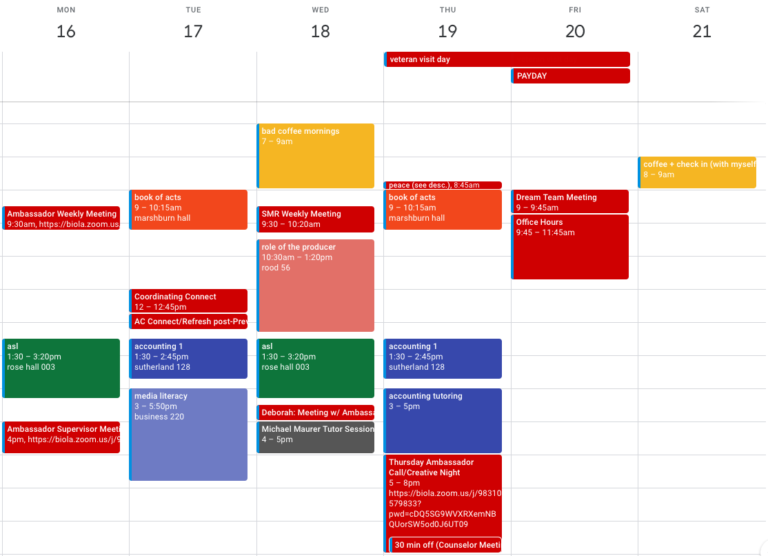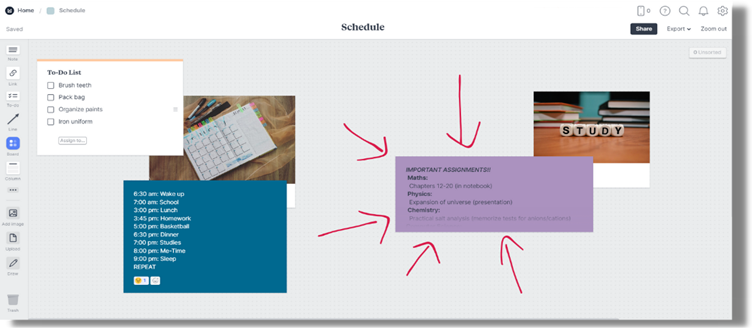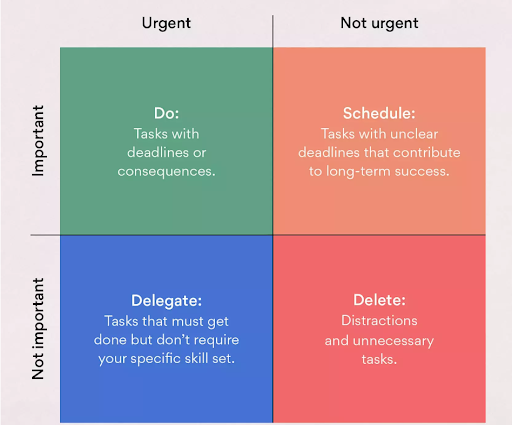Mojza Blog
How to make a study schedule - and follow it!
by Zoella Ahmad | 10 Oct 2022

Feeling frustrated because you find it challenging to complete your schoolwork? Is homework consuming all your free time, leaving no room for personal leisure? If so, what you’re looking for is an effective study schedule.
What is a study schedule?
A study schedule is a plan that clearly illustrates all the timings of the studies you’ve planned and the activities or tasks you have to perform before, during, or after that.

How to make a study schedule
Study schedules may seem like redundant , useless things to some, but they have been proven to boost productivity, lessen stress, and contribute to effective time management. So, in order to make a study schedule, to do is to roughly sketch a plan for what you want to spend your time on. Allocate specific time slots for your daily activities apart from studying, e.g. school, lunch, scrolling through TikTok (guilty ) and extracurricular activities etc. This will then help you set time for your studies more easily. For more on how to balance extracurricular activities alongside studies, go through our blog here. After planning out the activities for the day, estimate the amount of time you’ll need every day for your homework and additional studies alongside extra activities. This can range from 30 minutes to 3-4 hours a day.
, useless things to some, but they have been proven to boost productivity, lessen stress, and contribute to effective time management. So, in order to make a study schedule, to do is to roughly sketch a plan for what you want to spend your time on. Allocate specific time slots for your daily activities apart from studying, e.g. school, lunch, scrolling through TikTok (guilty ) and extracurricular activities etc. This will then help you set time for your studies more easily. For more on how to balance extracurricular activities alongside studies, go through our blog here. After planning out the activities for the day, estimate the amount of time you’ll need every day for your homework and additional studies alongside extra activities. This can range from 30 minutes to 3-4 hours a day.
The next step is to create the schedule. In this day and age, you can find a myriad of online websites or apps that allow you to create schedules effortlessly. Here are a few free options worth considering:
Google Calendar:
You probably already know about Google Calendar. It allows you to create daily, weekly, monthly, and even yearly schedules. With its easy-to-use interface, it’s definitely understandable that it is many people’s go-to for schedule-making.

milanote
Milanote is a relatively less popular app, yet it remains a valuable tool to be utilised. Milanote offers various tools for customisation, allowing you to personalise every aspect to your liking. This app is tailor-made for those who like to do things their way.

Other apps include:
Calendar App
Calendly
Bookafy
Notion Desktop App for Mac & Windows
However, if you prefer a more traditional approach, grab a pen and paper and start jotting down your study schedule!
How to stick to your schedule
So, you made your schedule. Now, how do you make sure you follow it?
making it realistic
While creating your schedule, keep one thing in mind: you are a human being and can only handle a certain amount of stress and workload. Avoid trying to cover an excessive number of subjects in one day or studying for six to seven hours on top of school. Overloading your schedule may lead you to make excuses and ultimately disrupt your entire routine. Set achievable goals for yourself – even if it’s just half an hour of study or a single subject – and try your best to meet them every single day. If you find a study schedule that aligns perfectly with your study stamina, stick to it and maintain consistency.

Prioritising Tasks and Subjects Using the Eisenhower Matrix
When it comes to managing your study schedule effectively, prioritisation is key. One helpful technique is the Eisenhower Matrix, a simple yet powerful tool that helps you prioritise tasks based on their urgency and importance. With this method, you categorise tasks into four quadrants: Urgent and Important, Important but Not Urgent, Urgent but Not Important, and Not Urgent or Important. By using the Eisenhower Matrix, you can channel your time and energy in the tasks that truly matter, ensuring that you make progress in the areas that require immediate attention while still giving importance to tasks that contribute to long-term goals. This implies that you accomplish the tasks that you have to immediately, while tackling less urgent tasks later. For further time and task management tips, check out our blog on mastering time management.

giving yourself a break
Sitting down and studying for a long time, without any breaks, can cause fatigue and have detrimental effects on your health. There’s a reason sitting has been referred to as ‘the new smoking’. To address this, try using the Pomodoro technique for studying.
This technique involves completing a task in 25 minutes, after which you should take a 5-minute break. After repeating this cycle a few times, take a longer break of about 30-40 minutes. ‘Pomodoro’ is Italian for ‘tomato’, and this technique was created by Francesco Cirillo, who was inspired by a tomato-shaped kitchen timer he owned, which had a default duration of 25 minutes.
The Pomodoro technique effectively helps combat mental fatigue and promotes sustained concentration. To read more on the Pomodoro and other studying techniques, don’t forget to read our designated blog here.
reserving some 'me time'
Make sure to put aside some time for yourself. This time may be two hours, or it may be half of that. You are the judge of what works best for you. Schedule this break after you’ve completed your homework and/or studies so that you feel rewarded after your day’s diligent work. By doing so, you’ll feel more motivated to study every day.
During this time, engage in activities you enjoy, such as painting, using social media apps, participating in sports, photography, reading, or even sleeping.
This time is meant for rest and relaxation. Let go of your burdens and enjoy your well-deserved break.

making your schedule flexible
To maintain flexibility in your schedule, it’s important to avoid rigid timings. Give yourself some extra time for each task, around 5-15 minutes more than you had planned. For example, if you plan on practising Maths for 1 hour from 9pm to 10pm, add about ten additional minutes to your time slot. This way you can account for any unexpected obstacles or distractions that might pop up during the day.
Prioritise your tasks and allocate your time accordingly, but be open to changing your schedule if something unexpected happens. This ensures that you’re able to focus on your studies without worrying about not following your schedule exactly. If you often find yourself stressing over your academics, try reading our blog on how to deal with academic stress.
creating a productive study environment

Another crucial aspect of effective studying is creating a conducive study environment. Find a well-lit area with minimal distractions where you can focus and concentrate. Ensure your study space is comfortable and organised, with everything you need within reach. Remove any unnecessary clutter and consider adding personal touches that inspire and motivate you. By designing a dedicated study space that suits your preferences, you can optimise your focus and make the most out of your study sessions. Another factor that is important for the ideal study environment is quietness, so that you’re not distracted. Additionally, your study space doesn’t even have to be a place in your home, it can be the library or a park. Just somewhere you can focus devotedly and entirely on your studies. Feel free to check out our blog on reducing distractions for a more in-depth look into how you can cut down distractions and create a calm learning environment.
having an accountability partner
Being accountable to someone regarding your studies can help you stay on track. Choose a study partner and communicate your daily study goals to them. At the end of the day, update them on whether or not you were able to achieve those goals. This mutual accountability will motivate you to complete your studies.
important
It is essential to set an early bedtime for yourself. An average teenager must get 8-10 hours of sleep per day. Sleep affects our brain development, which does not fully mature until a person is at least 25 (you can pull all the all-nighters you want after that).
Research has shown that sleep deprivation leads to decreased cognitive function, shortened attention spans, lack of energy, mood swings, and various other negative side effects. As evident, sleep directly impacts our ability to study effectively. So keep this in mind the next time you decide to compromise on your sleep!
Study schedules, if planned effectively and followed religiously, can be lifesavers for students, especially during exams. And now that you have all the necessary information, it’s time to create your own study schedule. Best of luck!
Acknowledgements
Author: Zoella Ahmad
Editors: Hadia Ieman, Alia Naeem, Shaheer Ali
Recent
Mojza
About Mojza
Mojza is a student-led organisation aiming to provide quality resources for Cambridge students.
Other than such weekly blogs, Mojza offers resources for your O levels, IGCSE, and A levels journey. We have notes from reputable teachers, our own original notes and a library of other helpful websites and resources!
Check out our home page!
Published: 2 October 2022
Last Updated: 12 July 2023
Written by Zoella Ahmad
